Self-Immolated Kurdish Prisoner Sent To Solitary Cell After Hunger Strike
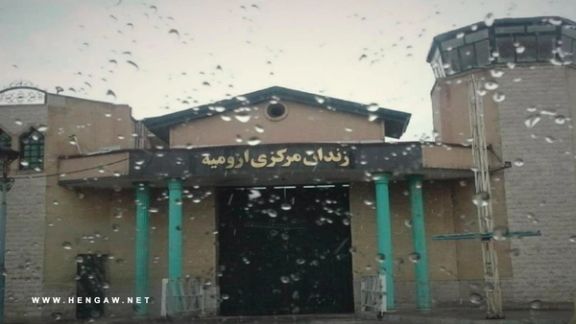
A Kurdish political prisoner who self-immolated at the Central Prison of Orumieh, was transferred to solitary confinement after going on hunger strike.

A Kurdish political prisoner who self-immolated at the Central Prison of Orumieh, was transferred to solitary confinement after going on hunger strike.
Omarpour was sentenced to 10 years in prison in March last year on the charge of "cooperating with Israeli intelligence and espionage."
A year earlier, he and nine other citizens were arrested on similar charges. Following several months of torture in solitary cells, four were executed in January, according to Hengaw.
Omarpour self-immolated in February in response to prison guards attacking him and his inmates.
Kurds continue to come under disproportionate oppression in Iran along with minorities such as the Bahai and Baluch.
Of last year’s record numbers of executions, large numbers were Kurds and minorities.
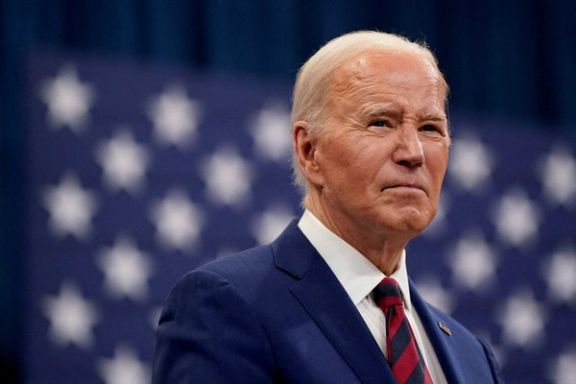
The United States could get into war with Iran if Tehran launches a major attack on Israel, Joe Biden has said, amid a cacophony of threats and counter-threats from officials in Tehran and Jerusalem.
In an op-ed for Wall Street Journal Wednesday, President Biden called on the US Congress to pass military aid for Israel to ensure that it’s “fully stocked and ready” to defend herself.
“If Iran succeeds in significantly escalating its assault on Israel, the US could be drawn in,” Biden warned. “Israel is our strongest partner in the Middle East; it’s unthinkable that we would stand by if its defenses were weakened and Iran was able to carry out the destruction it intended this weekend.”
President Biden has been trying hard since October 7 to avert a full-scale war in the Middle East, exhausting overt and covert diplomatic channels to restrain Israel and Iran. His job has become much more difficult since April 13, when the Iranian regime launched more than 300 drones and missiles towards Israel in response to the bombing of one of its buildings in the Damascus embassy, which killed the IRGC’s top commander in Syria and his deputy.
In the past few days, officials in both Israel and Iran have hardened their rhetoric, uttering threats that seem to get more severe by the day.
On Wednesday, Israel’s finance minister Bezalel Smotrich said that Israel’s response to Iran’s attack should inflict a “disproportionate toll” and “rock Tehran” so that the leaders of the country “regret the moment they even thought about firing”.
Smotrich is the leader of the far-right Religious Zionism party, He is not a member of the war cabinet, but wields considerable power because a ‘coalition deal’ means he is technically also a minister in Israel’s defense ministry. Speaking to Israel’s Army Radio (GLZ), he called for an Israeli retaliation that would make the Iranian regime “realize they shouldn’t mess with” Israel. “This is the language spoken in the Middle East,” he said.
In Tehran, President Ebrahim Raisi proved that this was indeed the language spoken in the Middle East. Even the “tiniest” Israeli attack on Iran, he said at a military parade, would bring “a severe and harsh response.” The IRGC commander in charge of missiles and drones, Amir Ali Hajizadeh, seconded the president. Asked by a reporter if they would strike Israel again if they retaliate against Iran's attack, he said “one-hundred percent.”
But this wasn’t the end. There were more threats to come from Israel.
Former director of intelligence at Mossad, Zohar Palti, suggested in an interview that targeting nuclear facilities can be an option. “Everything is on the table right now,” he told the British broadcaster Sky News. Asked whether that included targeting nuclear facilities, he said, “including everything.”
Palti is not an Israeli official. But Smotrich is. So are Raisi and Hajizadeh and many more voices on both sides calling for severe measures to establish ‘deterrence.’
The Biden administration –and other world leaders to a lesser extent– will have a difficult task de-escalating a situation that seems to be getting more tense by the day.
The US and the EU have announced their intention to impose more sanctions related to Iran, targeting those individuals and entities that help Tehran's destabilizing activities. However, that the effective way to exert pressure is to enforce the oil export sanctions already in place that the Biden administration has not pursued vigorously.
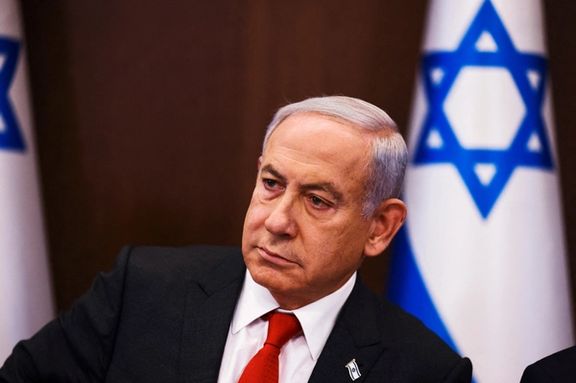
After a meeting with the British and German foreign ministers, Israeli Prime Minister Benjamin Netanyahu stated that Israel will make its own decisions regarding its response to Iran's missile and drone attacks.
"I thank our friends for their support for Israel's defense, both in words and in deeds. They also have various proposals and advice, which I appreciate, but I want to clarify that we will make our own decisions. The State of Israel will do whatever is necessary to defend itself…,” Netanyahu said.
British Foreign Secretary David Cameron and German Foreign Minister Annalena Baerbock had traveled to Jerusalem amid the escalating tensions between Iran and Israel,
Experts say their visit was likely intended to express solidarity following Iran's attack on Israel and to discuss the ongoing war in Gaza, including the humanitarian aid situation.
While Cameron emphasized the importance of minimizing escalation and ensuring a “smart” approach, he told reporters after the meeting that “it's clear the Israelis are making a decision to act".
The British Foreign Secretary also wrote on X that during the meeting he told the Israeli Prime Minister that they “must maintain [their] focus on getting more aid into Gaza and getting hostages out".
Echoing those comments, Baerbock reiterated Germany's solidarity with Israel while she cautioned against escalation, stating that “everyone must now act prudently and responsibly”.
“A spiraling escalation would serve no one, not Israel’s security, not the many dozens of hostages still in the hands of Hamas, not the suffering population of Gaza, not the many people in Iran who are themselves suffering under the regime, and not the third countries in the region who simply want to live in peace,” Baerbock said.
Iranian President Ebrahim Raisi meanwhile threatened that even the slightest incursion into Iran would trigger severe retaliation, like increasing the diplomatic pressures on Israel to avoid a major escalation.
Speaking today at Iran’s annual Army Day, which was relocated to a barracks without any explanation from the authorities, Raisi warned that even the "tiniest invasion" by Israel would be met with a "massive and harsh" response from Iran.
G7 foreign ministers are also meeting this week in Italy to discuss targeted sanctions against Iran and are widely expected to issue a joint plea urging Israel to show restraint in its response to Iran.
Italian Foreign Minister Antonio Tajani, who is hosting the talks, told AFP that the ministers were "working" on implementing some form of sanctions against Iran.
The US, Israel's key ally, has similarly pledged to impose further sanctions in the coming days.

Iran's recent crackdown on hijab rules has sparked outrage and drawn condemnation from women's rights advocates and prominent Iranian figures.
The denouncements follow reports of widespread arrests and police violence throughout the country.
Prominent Iranian scholar and university professor, Sedigheh Vasmaghi, denounced her arrest for defying mandatory hijab laws.
Currently imprisoned in Tehran's Evin Prison, Vasmaghi, in a message dated April 2024, condemned the authorities' actions as "antipatriotic and against national interests."
"Ordering engagement with people, particularly women, for a specific reason like hijab enforcement is not only unpatriotic and unforgivable, but also detrimental to the nation's well-being," Vasmaghi's message from prison reads. "The inevitable consequences of this order will undoubtedly fall on those who issued it and those who carry it out."
Jailed Iranian human rights activist and Nobel laureate, Narges Mohammadi, joined the chorus of condemnation. "Desperate to mask its crumbling legitimacy and failing authority," she asserted from Evin Prison, "the Islamic Republic has transformed the streets into a battleground against women and youth, wielding fear and intimidation as weapons."
Mohammadi further emphasized that the regime's "shameful domestic domination and brute force" are a pathetic attempt to compensate for its "weak and absurd claims" on the world stage. "The ongoing civil disobedience and brave resistance of Iranian women in the streets," she concluded, "have shaken the foundations of the Islamic Republic."
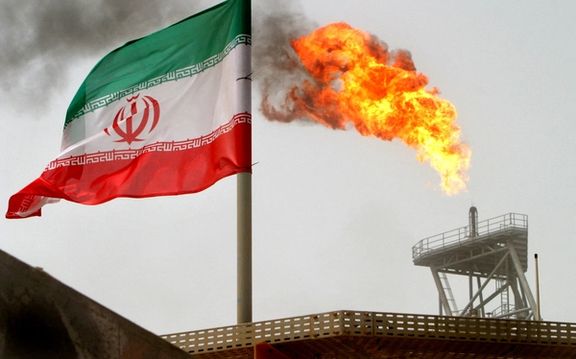
In response to impending US and EU sanctions against Tehran, Tasnim, a news outlet affiliated with the IRGC, asserted that Iran will continue to evade the sanctions.
Following Tehran's attack on Israel over the weekend, sanctions against Iran are expected to be imposed in the coming days.
In a report titled "New sanctions, fake or real?" published on Wednesday, Tasnim stated that the new sanctions on Iran would be ineffective.
"The severity of the sanctions imposed over the years, especially in the last decade, has been at its highest level, and the Iranian economy has learned resilience and methods of circumventing these sanctions well," Tasnim’s report read.
Tasnim itself was sanctioned last year by the US, in connection “with the Iranian regime’s violent suppression of nationwide protests following the death of Mahsa ‘Zhina’ Amini.”
In a response to Iran’s attack, the US House of Representatives passed legislation aimed at countering China’s purchase of Iranian crude oil as part of a package of bills being brought to the floor.
Tasnim’s report claims that the demand for Iranian oil from major manufacturing countries like China acts as a constraint on Washington's ability to enforce new oil sanctions against Iran.
In the past months, Iran has heavily relied on exporting millions of barrels from floating storage to boost its oil exports to Beijing.
Earlier this week, US Treasury Secretary Janet Yellen addressed Iran's ongoing oil exports despite US sanctions, stating that "...there may be more that [the US] can do".
The head of the Iran-Iraq Chamber of Commerce, Yahya Ale Eshaq, told Tasnim that the talk of increased sanctions is more of a psychological game and that given the risk of higher oil prices, "the Americans will not have much power" to impose sanctions.
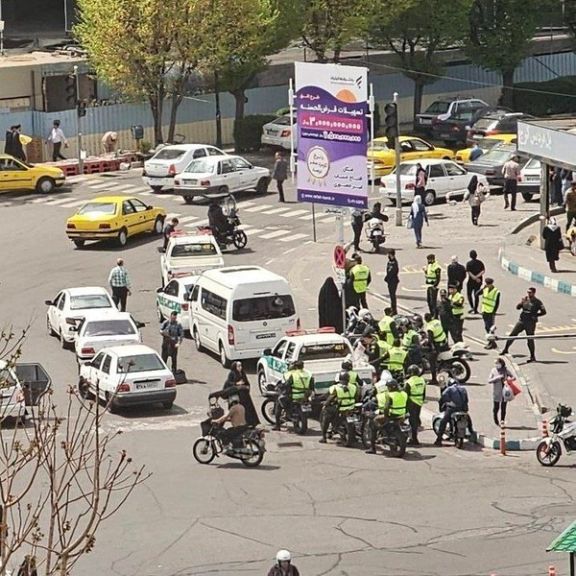
Many believe that the current "state of war" with Israel may provide the Islamic Republic with an opportune window to more effectively deal with its ongoing domestic challenge of quashing dissent.
Some Iranian social media users believe that the authorities’ sudden intensification of the crackdown on women over the mandated hijab could be a deliberate attempt to divert attention from Tehran’s missile attacks on Israel.
Others suggest it may have been aimed at suppressing potential anti-war protests that could overshadow the regime’s claims of victory regarding the "hard revenge" operations planned against the Islamic Republic's archenemy – the "Zionist regime".
Omid Shams, a lawyer and director at the London-based NGO Justice for Iran, however, finds a direct correlation between the new wave of hijab crackdown and foreign conflict.
“There is a historical precedence to this,” he told Iran International, explaining that in the early days of the Islamic Revolution, when war with Iraq began in 1980, Iran's then-ruler Ruhollah Khomeini similarly found the time right to realize his wish to force women into wearing the hijab.
Woman resisting arrest by morality police in Rasht in northern Iran
“In a state of emergency such as war, governments are empowered to act against the civil society and to create an atmosphere of fear to weaken it,” Shams said. “I think Khamenei took advantage of the current circumstances to do something that could have sparked a strong reaction from the public if he had done it in normal circumstances, when the society could focus on the issue and react to it without being distracted by other problems such as this stupidity that is threatening the existence of the country now.”
Hours before Saturday’s IRGC’s missile and drone attack on Israel, Iran’s so-called morality police waged a full-on war against unveiled women. Iranian authorities have also begun a crackdown on media and social media activists.
The police force’s infamous “guidance patrols”, often referred to as the “morality police”, have returned to the streets, Tehran’s metro stations and other cities across the country in full force, to enforce the Islamic dress code.
Woman being dragged by morality police to their van in eastern Tehran
The patrols had largely vanished from the streets after the death of the 22-year-old Mahsa Jina Amini in their custody, which sparked widespread and months-long protests across the country. This year, a UN report found the Iranian authorities responsible for the physical violence in detention that led to Amini’s death.
Since Saturday, the patrols consisting of male and female uniformed police and plainclothes agents, have arrested at least dozens of women violently as videos and reports on social media attest.
On Tuesday Dina Ghalibaf, a 24-year-old post-graduate student of political science and journalist, was arrested at her home in Tehran for describing in a tweet her own recent encounter with the police for hijab.
In her post, Ghalibaf said she was refused entry to the subway because she was unveiled. When she insisted that she had a right to use the metro, she was tasered and violently taken to an office. There, she said, one of the police officers who constantly mocked and insulted women caressed her face tantalizingly, while she was in handcuffs.
To enforce the hijab, some universities now require women to pass through gates equipped with facial recognition technology. They are prevented from entering if their appearance does not comply with the Islamic dress code.
Authorities have also threatened restaurants and all other businesses with closure if they serve unveiled women or offer them services.
Female officers dragging a woman to their van
Iran International has also learned that the intelligence organization of the Islamic Revolutionary Guards (IRGC), known as SAS, has ordered journalists and activists not to post any content critical of the attack on Israel on social media platforms, as this would be considered as “endangering the psychological security of the society”, and to remove anything that has already been posted.
Mahdieh Golrou, a Sweden-based political activist, told Iran International TV that on Saturday the Supreme National Security Council summoned managing directors of newspapers and news websites and told them they were not allowed to criticize the IRGC’s operations against Israel.
According to Golrou, managing directors were also told they would be held responsible and punished if any of their journalists did so privately.
Authorities have accordingly prosecuted several journalists, social media activists and newspapers including prominent reformist columnist Abbas Abdi and the reformist outlet Etemad for criticizing the conflict and escalation or warning about the consequences of a war.
These actions by Iranian authorities suggest a "state of war and a state of emergency pursuant to it," noted an article published by the reformist Jamaran news website on Monday. The statement criticized the government's attempts to curb all criticism and to force individuals and media outlets to parrot the official line on the matter.






